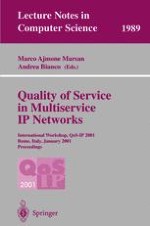2001 | OriginalPaper | Buchkapitel
Requirements on the TCP/IP Protocol Stack for Real-Time Communication in Wireless Environments
verfasst von : Larzon Lars-Åke, Mikael Degermark, Stephen Pink
Erschienen in: Quality of Service in Multiservice IP Networks
Verlag: Springer Berlin Heidelberg
Enthalten in: Professional Book Archive
Aktivieren Sie unsere intelligente Suche, um passende Fachinhalte oder Patente zu finden.
Wählen Sie Textabschnitte aus um mit Künstlicher Intelligenz passenden Patente zu finden. powered by
Markieren Sie Textabschnitte, um KI-gestützt weitere passende Inhalte zu finden. powered by
A strong trend in the Internet is to provide wireless Internet access to handheld devices. Radio spectrum is a scarce and expensive resource, and a wide-area cellular system that provides satisfying quality for a data service based on the traditional TCP/IP protocol stack will be expensive. This becomes especially problematic for real-time communication based on UDP.To design an economically viable system, dierent approaches are available. New protocols can be designed that take wireless systems into account. The Wireless Application Protocol (WAP) is an example of such a protocol. Alternatively, the existing TCP/IP protocols can be modified to better support cellular systems. The development of WAP is tempting since it does not have to modify the TCP/IP Protocol stack. However, to provide future proong, it is a better idea to base the protocol architecture for wireless on TCP/IP since this will be the dominant Internet protocol stack for years to come.This paper discusses requirements on various layers in the TCP/IP protocol stack to better support real-time data services. One key component is a transport layer designed to use limited bandwidth more efficiently for real-time services. Changes are required to other layers as well, but these can be deployed where needed without disturbing the rest of the Internet. By applying these changes, it becomes possible to provide cost efficient, real-time services based on IP in cellular systems.
